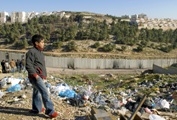
Since Israel’s illegal annexation of East Jerusalem in 1967, life for the city’s Palestinian East Jerusalemites has been a continuing cycle of neglect, discrimination, poverty, and shortages.
Palestinian East Jerusalemites hold the status of “permanent residents” of Israel. Permanent residents are required to pay taxes and are entitled to vote in the municipal elections and receive all the basic services provided by the municipality. Nonetheless, for the past four decades, the Israeli government has not budgeted resources for strengthening and developing East Jerusalem-resources that are essential for meeting the physical needs of the area and the needs of the population at its natural growth rate. As a result, there exists a severe shortage of public services and infrastructure in East Jerusalem, including health and education services, welfare services, postal services, water and sewage systems, and roads and sidewalks. The Municipality also discriminates against the Palestinian residents of East Jerusalem by enforcing a discriminatory building and planning policy, preventing them from obtaining building permits and then demolishing “illegal” homes and construction.
Though we regard East Jerusalem as occupied territory, ACRI’s position is that as long as Israel continues to exercise control over East Jerusalem and maintain responsibility for the welfare of its Palestinian residents, Israel is obligated under both Israeli law and international law to provide the Palestinian population with services that are on a par with the level of services provided within its own sovereign territory.
Photo by: Rita Yurkovich
Resources on East Jerusalem:
ACRI Calls for End to Employment of Private Guards in E. Jerusalem, October 2010
ACRI Report: Authorities Side with Settler Groups in East Jerusalem, September 2010
ACRI, Ir Amim in New Report: Neglect of Education in East Jerusalem Persists, August 2010
ACRI Petitions High Court against Deficient Postal Service in East Jerusalem, June 2010
New ACRI Report on East Jerusalem Highlights Education, Welfare, May 2010
ACRI, Partners Submit First Principled Petition against House Demolitions in East Jerusalem, November 2009
Court Accepts Petition on Illegal East Jerusalem Construction, September 2009
ACRI Status Report on Failing Education in East Jerusalem, September 2009
Court Orders Ministry to Find Immediate Solution for Shaofat School, August 2009
Life in the Garbage: A Report on Sanitation Services in East Jerusalem, July 2009
Jerusalem 42 Years Later: Where East and West Are Worlds Apart May 21, The Huffington Post
The State of Human Rights in East Jerusalem 2009: Facts and Figures May 19, 2009
200 Days of Grace: Israeli Policy in East Jerusalem in the Nir Barkat Era May 19, 2009
Wake Up Call: Jerusalem Is Not Unified
Following ACRI’s Plea: Municipality Forms will be Translated to Arabic
April 2009
Jerusalem Court Instructs Municipality To Halt Construction in Wadi Hilwa-Silwan, April 2009
ACRI Forces Police to Publish East Jerusalem Procedures, March 2009
ACRI to Mayor Barkat: Don’t Demolish Homes of Terrorists, March 2009
Request to Cancel Demolition Orders in the Ras Khamis Neighborhood, March 2009
“New Tensions in Jerusalem’s Arab Neighborhoods”, The New York Times, December 7, 2008
ACRI and Bimkom: Stop City’s Unauthorized Work in East Jerusalem, Petition summary, November 2008
ACRI Submits Two Petitions on Behalf of East Jerusalem Children, September 24, 2008
“Will They Ever Learn?”, The Jerusalem Post, September 12, 2008
East Jerusalem’s Education Crisis, BBC News, September 6, 2008
Mock Classroom at Jerusalem City Hall to Protest Neglect of East Jerusalem’s Children, September 4, 2008
Separation Barrier Cuts East Jerusalem Families Off from Daily Lives, July 2008
Facts and Figures about East Jerusalem, June 2008
ACRI Urges Ministers to Ensure Adequate Water Supply in East Jerusalem, February 2008
ACRI Forces Municipality to Find Classes for East Jerusalem Children, November 6, 2007
ACRI: End Illegal “Debt Collection” Roadblocks in East Jerusalem, August 2007







